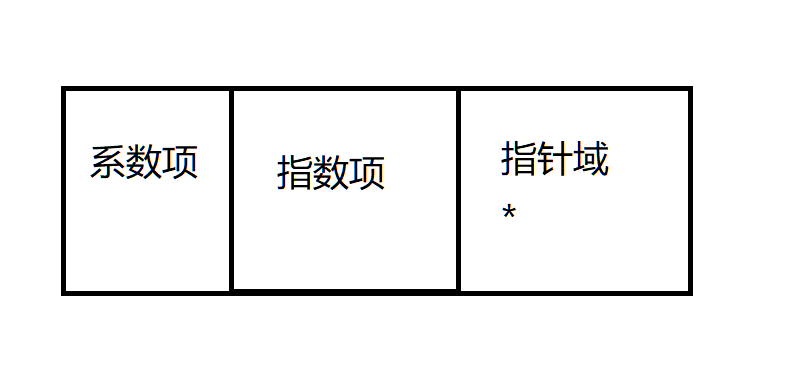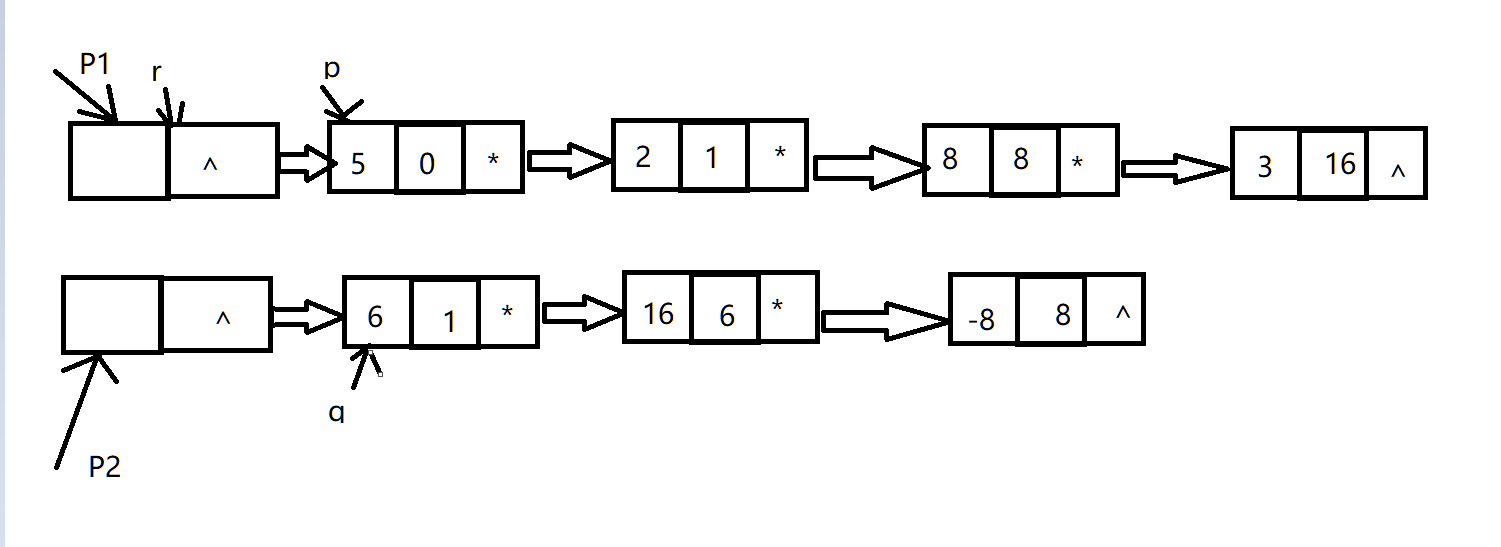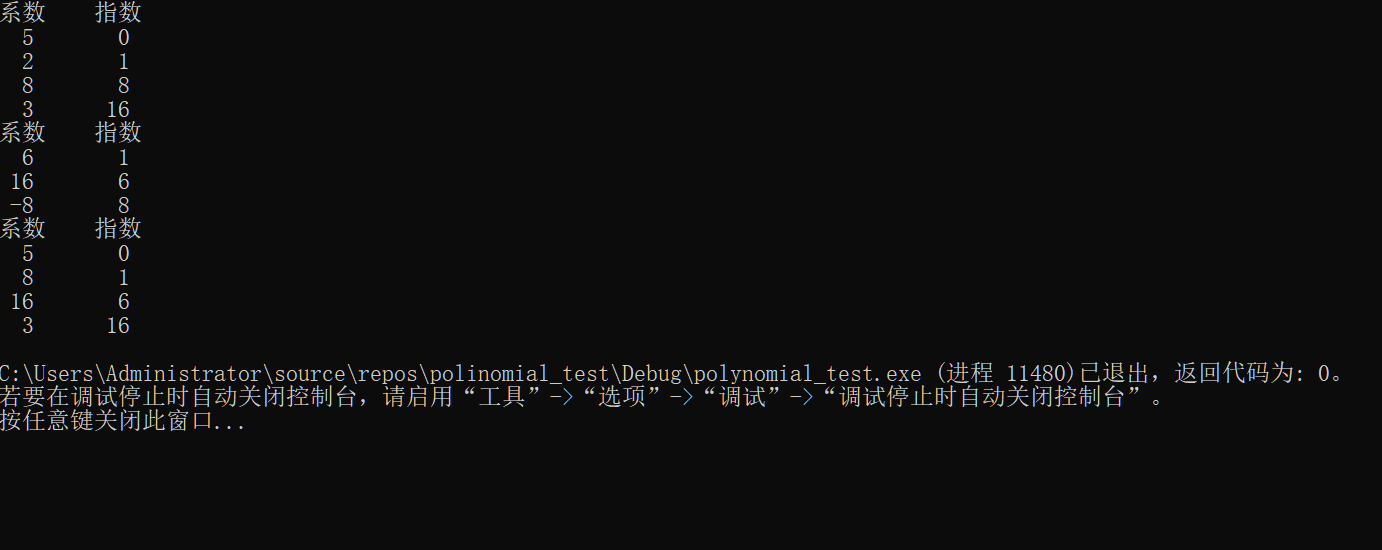多项式合并
思路
-
多项式合并
P1 = 5 + 2x + 8x ^8 +3x^16
P2 = 6x + 16x^6 - 8x^8
P = P1 + P2 = 5 + 8x + 16x^6 + 3x^16
-
使用带头结点的单向不循环链表
-
每个节点分为三个部分,系数项,指数项,指针域

-
结构体表示为
struct node_st {int exponent;int coefficient;struct node_st *next; }; -
定义两个指针p,q,分别指向多项式P1,P2第一个有效节点
-
在定义一个指针r,保存合并结果,p的前驱指向不确定,r表示p的前驱,r可以指向p,也可以指向q
-

-
比较p指向节点的指针项与q指向节点的指针项
-
p->exponent == q->exponent
指数项不变,系数项相加
- 若系数之和为零
p = p->next;
q = q->next;-
若系数之和不为零
r->next = p;
r = p;p = p->next;
q = q->next;
-
p->exponent > q->exponent
r->next = q;
r = q;
q = q->next; -
p->exponent < q->exponent
r->next = p;
r= p;
p = p->next;
-
代码
main.c(负责测试)
#include<stdio.h>
#include<stdlib.h>
#include "polynomial.h"
int main()
{//p1,p2表示多项式struct node_st *p1 = NULL, *p2 = NULL;//数组中第一个元素为系数,第二个元素为指数int arr1[][2] = { {5,0},{3,16},{8,8},{2,1} };int arr2[][2] = { {16,6},{-8,8},{6,1} };p1 = poly_create(arr1,4);if (p1 == NULL){return -1;}p2 = poly_create(arr2,3);if (p2 == NULL){return -1;}poly_show(p1);poly_show(p2);poly_union(p1, p2);poly_show(p1);poly_destroy(p1);poly_destroy(p2);return 0;
}
polynomial.c(负责函数定义)
#include<stdio.h>
#include<stdlib.h>
#include "polynomial.h"struct node_st* poly_create(int arr[][2],int row)
{struct node_st *ps = NULL,*prenode = NULL,*curnode = NULL;struct node_st *newnode = NULL;int i = 0;//生成头结点ps = (struct node_st*)malloc(sizeof(struct node_st));if (ps == NULL){return NULL;}ps->next = NULL;for (i = 0; i < row; i++){prenode = ps;curnode = ps->next;//按照指数从小到大的顺序插入有效节点while ((curnode != NULL) && (curnode->exponent < arr[i][1])){prenode = curnode;curnode = curnode->next; }//生成新节点newnode = (struct node_st*)malloc(sizeof(struct node_st));if (newnode == NULL){return NULL;}newnode->coeffitient = arr[i][0];newnode->exponent = arr[i][1];newnode->next = prenode->next;prenode->next = newnode;}return ps;
}void poly_show(struct node_st* ps)
{struct node_st *p = ps->next;printf("%3s\t%3s\n", "系数", "指数");while (p){printf("%3d\t%3d\n", p->coeffitient, p->exponent);p = p->next; }
}//多项式合并,p2向p1上合并,p1保存合并后的结果
void poly_union(struct node_st *p1, struct node_st *p2)
{struct node_st *p = p1->next;struct node_st *q = p2->next;struct node_st *r = p1,*temp=NULL;while (p&&q){if (p->exponent > q->exponent){temp = (struct node_st*)malloc(sizeof(struct node_st));if (temp == NULL){return;}temp->coeffitient = q->coeffitient;temp->exponent = q->exponent;temp->next = q->next;r->next = temp;r = temp;q = q->next;}else if (p->exponent < q->exponent){r->next = p;r = p;p = p->next;}else if (p->exponent == q->exponent){p->coeffitient += q->coeffitient;if (p->coeffitient){r->next = p;r = p;}p = p->next;q = q->next;}}if (p == NULL){r->next = q;}if (q == NULL){r->next = p;}}void poly_destroy(struct node_st* ps)
{struct node_st *cur = ps->next,*next = NULL;while (cur){next = cur->next;free(cur);cur = next; }free(ps);ps = NULL;
}polynomial.h(负责函数声明)
#ifndef POLYNOMIAL_H__
#define POLYNOMIAL_H__
struct node_st
{int coeffitient;int exponent;struct node_st *next;
};
struct node_st* poly_create(int arr[][2], int row);
void poly_show(struct node_st* ps);
void poly_destroy(struct node_st* ps);
void poly_union(struct node_st *p1, struct node_st *p2);
#endif
运行结果



)



![优秀工程师应该具备哪些素质_一名优秀工程师所需要具备的条件和素质[1]](http://pic.xiahunao.cn/优秀工程师应该具备哪些素质_一名优秀工程师所需要具备的条件和素质[1])
![链方法[C# 基础知识系列]专题三:如何用委托包装多个方法——委托链](http://pic.xiahunao.cn/链方法[C# 基础知识系列]专题三:如何用委托包装多个方法——委托链)


)






)
)
